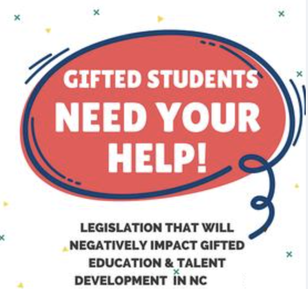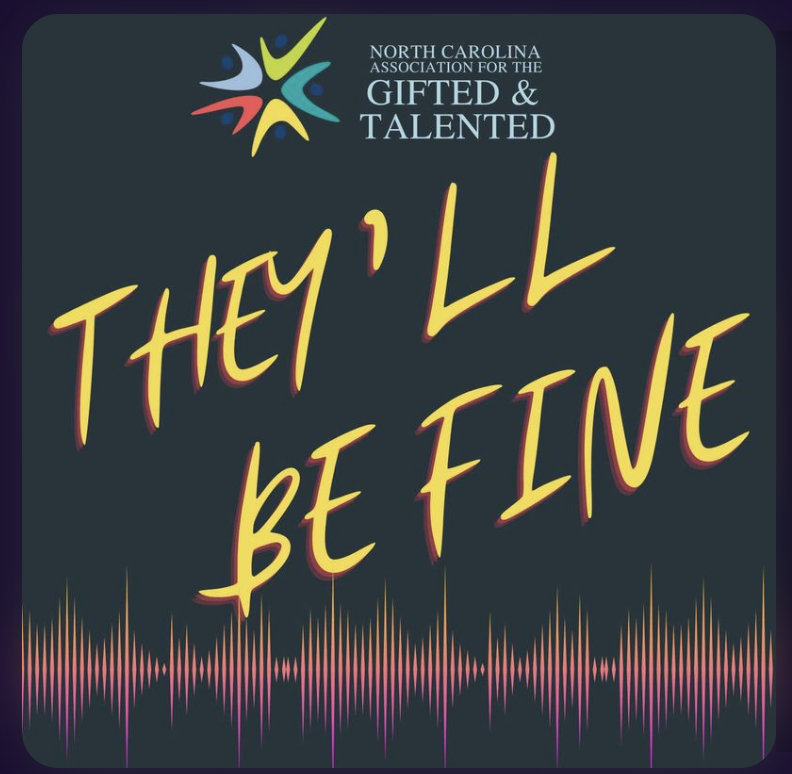PAGE of Wake County
|
If you're just now learning about the shocking changes proposed to educational funding and gifted program funding in North Carolina, you are probably thinking, "How can I prevent this?"
Contacting your representatives individually can make a big impact, as detailed in our last blog post. Organized advocacy can be even more impactful. To that end, PAGE is eager to form an advocacy committee to help positively influence educational policy affecting our students. Even if you feel you don't have expertise in this area, we urge you to join us. We so often hear from parents and educators who see what gifted students need and the ways that reduced resources harm our kiddos. We're waiting for someone to do something and realizing: we're the someones. Please join us, even if you only have a few minutes a month to spare. We'd love to have you, support you, and be your community! Volunteer - Details: https://www.wakepage.org/volunteer.html We would like to ensure you have seen the request relating to the proposed legislation in North Carolina relating to educational policy and funding (NC AGT is the parent organization for PAGE of Wake County)
https://tinyurl.com/attack-on-gifted-funding From the NC AGT post linked above: (This budget would result in:) "Elimination of entire programs and services from some communities (e.g., low-income, rural, underrepresented racial and ethnic groups). Entire districts could now receive $0 from the state for AIG. Reduction/elimination of talent development programs. If only the top 4% of students in the state are identified, then many currently identified students will be forced to be "degifted". There will be no funding to support services for them. Reduction of identified gifted students from 163,115 (April 2022) to 55,128 out of the 1.3 million students currently enrolled in NC schools" Other articles on this topic (with a broader focus on educational policy- not limited to gifted educational policy/ funding): https://governor.nc.gov/.../state-emergency-public... https://www.newsobserver.com/.../article275659111.html https://www.ednc.org/2023-01-23-nc-legislature-education.../ https://www.ncleg.gov/Com.../CommitteeInfo/HouseStanding/166 Disagree with the proposed legislation? Please Act Now: Contact your legislator to:
Find your Representatives Senate Ed Committee (Standing) Senators By County Update: Governor Roy Cooper has declared that public education in the state of North Carolina is facing a state of emergency. Visit his website to learn more. Episode 14 summary: Stephanie Higgs is a passionate, energetic, and engaging Gifted Educator and Differentiation Coach. She divides her time between daily gifted instruction and coaching teachers to enrich and extend learning to meet the needs of their diverse learners. In this episode, we discuss numerous “bite-sized bits” that teachers can take and use within their classrooms. Check it out here: https://rss.com/podcasts/ncagtpodcast/937666/
Thank you to annuity.org for giving PAGE permission to share this useful article! Teaching kids about money when they’re young lays the foundation for responsible money management later in life. Children whose parents emphasize the importance of financial literacy and encourage them to spend and save thoughtfully develop a healthy perspective on money.
It’s never too early to begin teaching your kids about money. But doing so is not as straightforward as you might assume. Some parents don’t feel confident enough in their own knowledge of financial matters to be comfortable teaching their kids about money. Others believe it’s inappropriate to burden young children with conversations about money or think, mistakenly, that children are too young to understand financial concepts. In fact, researchers from the University of Wisconsin-Madison studied the behaviors and attitudes of fourth and fifth graders who were exposed to financial education and concluded that “younger students can learn financial topics and that learning is associated with improved attitudes and behaviors which, if sustained, may result in increased financial capability later in life.” Beth Koblinger, author of the New York Times bestseller “Make Your Kid a Money Genius (Even If You’re Not),” wrote an article for NPR’s Making Sen$e, in which she described her encounters with parents of all economic backgrounds during a recent book tour. She realized that all parents, whether very wealthy or middle-income earners, had the same questions:
Click here to read the rest of the article on annuity.org!
We invite you to fill out our poll seeking opinions, ideas, and all things Super Saturday. We are hoping to re-start these sessions (which have been paused since COVID hit) and we're eager to get going again. Your opinion is invaluable in ensuring the sessions are just the right fit.
CLICK TO FILL OUT POLL (Depending on your device, this may appear incorrectly on a phone or directly embedded in the blog.) Direct link: https://docs.google.com/forms/d/e/1FAIpQLSeymxQ7nKuae0CQZwqC0qUSB_twiYAaEkEyf3WXSL1DHcuWkw/viewform?usp=share_link As an educator or parent, you're always looking for ways to help your children develop essential skills that will benefit them throughout their lives. That's why we're recommending educators check out Lead4Change.
It's a free leadership program for 6th-12th graders that teaches proven leadership skills for getting big things done. This program equips students with practical tools to affect change and make a difference, and even offers a chance to win real dollars for your school. While PAGE of Wake County is not affiliated with Lead4Change, we encourage you to visit their website at https://new.lead4change.org/ to learn more about this opportunity for students to unlock their leadership potential. |
AuthorPAGE of Wake County accepts offers for guest bloggers and requests for reposts of relevant content. Contact us. Archives
March 2024
Categories |
PAGE of Wake County 501(c)(3)






 RSS Feed
RSS Feed